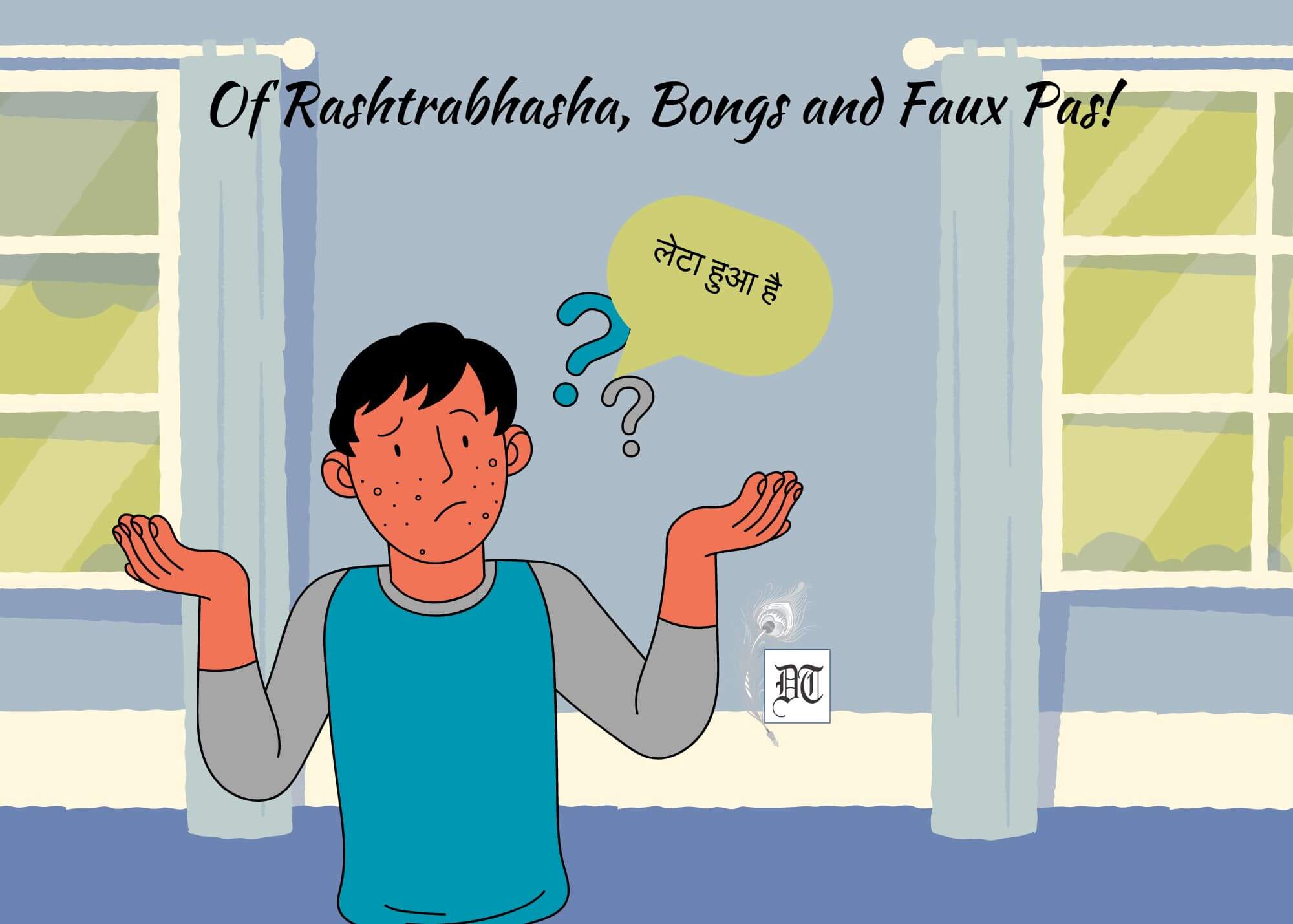Snow was very different to Phoolmashi and the British doctor, in London, in 1966. Balaka gives a hilarious account of snow from India in June. An exclusive for Different Truths.
Reaching London in the thick of summer, it became necessary for Phoolmashi to find a doctor. Her two-year-old princess of a daughter seemed a little under the weather. Just arriving from the sweltering heat of Calcutta, the pleasing mercury of the suburban Middlesex air may have tickled her cold tolerance. So, my uncle, Phoolmesho, with his still measured English, found an old gentleman who happened to be a pediatrician of some repute, not too far from them.
It was going to be Phoolmashi’s first one-on-one meeting with an Englishman. The thought of having to converse with a British doctor made her nervous and excited at the same time. It has been her dream, since childhood, to live in London, and had taken much care to learn enough English, her determination only doubled each time she was discouraged by a teacher who advised her to live by the Ganges instead of the Thames.
Now, this was happening for real. She’s in London, she reminded herself. It is upon her now to rebuild the lost image of India, in the eyes of our former rulers. So, she took all care to be the true representative of her lofty culture. Oh, by the way, this was happening back when Indians really worried about leaving a lasting impression on the “British” after the partition.

The year was, precisely, 1966. Phoolmashi, even in India, had been always striving to look and talk her best in front of the white folks, hoping they would immediately alter their ideas about her countrymen.
So, this self-appointed cultural ambassador meticulously took upon the task of projecting the suave, fashionable Indians with the most eclectic tastes of the times. She had brought with her, from India, an enormous jar of Ponds Snow. For the uninitiated, a brief detour to describe this little pink-lid jar with its shimmering-white creamy content is absolutely necessary before moving on with the story.
The soft pearly cream clogged the sweat pores of your face, leaving it sparklingly dry even during the sweltering summer months of Calcutta, the British capital for most part of their reign in the subcontinent.
It was the favorite among the white mem-ladies of the barasahibs of the British era. The Himalayan Snow brand had gained so much popularity in the ladies’ powder room conversations that “Snow” had earned its seat of honor among the desi memsahibs long after independence.
Its application needed a certain degree of dexterity that one mastered over time. The entire exercise had to be done in a quick sequence of spotting the face with this “Snow” and then briskly spreading the dots evenly over the skin. A few second’s careless delay, however, could dry up the cream into crumbly white flakes, which could justify its name.
Phoolmashi was quite good with it, too. After carefully inspecting herself in the mirror for the umpteenth time, smiling and talking in her natural flair, she was satisfied. Her saree, her makeup all fit very well. Her daughter was bright as a moonbeam in her lace frock. To make it better, Phoolmashi decided to dab some on her face as well. She stepped back to smile at her daughter. Yes, perfect. They were ready to go to their doctor.
At the clinic, after a few pleasantries, the doctor seated the baby on his table and was busy befriending her when he noticed a white speck on her chin.
“What’s on her cheek?” he asked.
Phoolmashi was quite alarmed at the possibility of something inappropriate being stuck on her chin, like a piece of cereal or who knows, even snot! And then she saw it.

“Ah, that? That’s just Snow,” she said, scratching it off with a flick of her fingers, and feeling completely relieved, and somewhat proud, to declare her fashion awareness. That’ll impress him, I’m sure. Even our kids put on Snow.
The expression that conquered the doctor’s face definitely confirmed her thoughts. For his eyebrows went up in jolly surprise. “Snow? Where did you get snow?” he asked.
What does he think of us, Phoolmashi thought, indignantly. Does he think all Indians to be so ignorant and poor as to not afford a jar of snow, or not have their tastes trained enough to use it? His opinion of our race definitely deserves a change.
Phoolmashi confidently declared, “Ah! I brought Snow from India, of course.” She threw a casual wave of her hand to make it look an absolute no brainer. In case he happened to think that she’s picked up a thing or two from England about living well, it was necessary to let him know she was already stylish before her arrival to these islands.
“Snow, from India! In June!” This time the doctor could not even pretend to conceal his surprise. He was trying to find the catch, the humor, in this statement, but clearly failed.
What has June got to do with this, thought Phoolmashi. Oh, these British folks are indeed hard to understand. She pitied the doctor for his ignorance. Time to change your thinking, old man, she thought. India is not quite what you think. In her zeal to uplift the image of Indians, she went on to explain, “In India, we always apply Snow on our faces, each time we go out.”

“Really?” his jaw now desperately needed strings to keep them from dropping to the ground. He didn’t know what else to say. All his ideas of India, the sweltering tropical subcontinent that harbored malarial mosquitoes, was being challenged. Not only did India produce enough snow for all people to apply on their cheeks in June, the snow didn’t seem to melt. It could be brought over from India and then stay crisp and white on the cheek hours after application.
The doctor’s face was an animated wave of expressions. But without words. He didn’t want to challenge his new patient’s mother, nor did he have the confidence to prove her wrong. His decades of schooling in personal courtesies and social politeness prevented him from screaming out his surprise. Phoolmashi took all that facial contortions with delight. Finally, she thought, someone courageous like herself had done it. She had been able to change the “hapless native” image of her countrymen.
While writing the prescription, the old doctor was still pensive. “Snow! From India! In this weather!” he murmured, his eyebrows still in limbo in the middle of his kinky forehead. Phoolmashi was patient. This is going to take some time to sink in, she thought compassionately. Finally, she came home, all satisfied. Her first conversation with a British had fared well. Not bad, she thought warmly.
Two years passed quickly. By then she’d learned that when the doctor wanted to give an injection in her daughter’s “bottom,” it happened to be her “behind,” which is always somewhere along the middle of her body and not under her feet. English was a strange language, she thought, despite of her love for the beautiful figurative expressions that she fell in love over time.
One June Saturday, they were invited to a party around lunch. Phoolmashi was giving the finishing touches to her saree pleats. Phoolmesho hollered from the door to hurry her up. She had just polka dotted her face with Snow. With her lips tightly pursed to prevent the stiff cream from spreading on the to-be-painted-red lips, she managed a mumble, “As soon as I’m done applying the Snow!” which sounded more like, “Phnow-mephphei-namphi.”
The moment the words escaped her mouth, it struck her like lightning. In the two years, she had had enough personal experience of the word to realise the impact of imagining “applying snow” on the face. That too, in June! She was appalled to realise what the doctor may have thought of her, while she was basking in the confidence of changing his colonial perceptions of Indians. She gurgled with laughter, squirmed in agony of embarrassment, and dreaded to face him again.
Phoolmesho hollered a “what’s going on up there?” from below for the final time, waking her up from her social postmortem. She hurried down the steps, deftly holding her saree pleats to avoid a stumble and hurriedly declaring that she needed to switch to another pediatrician in the area.
It was too off topic for the occasion, thought Phoolmesho. It’s a Saturday, and their daughter is doing perfectly fine. “What’s wrong?” he asked. “I really don’t know, it’s just a gut feeling that he’s not the right fit, perhaps … can’t put a finger on it,” she mumbled, realising that she’d already raised a doubt in her husband’s mind about a hidden secret. She didn’t talk much in the car, her first “conversation” repeating itself over and over again in her head.
©Balaka Ghosal
Photos from the Internet
#DifferentTruths #Confusion #Humour #Snow #Britain #LostinTranslation





 By
By

 By
By
Wonderful and very lucid description of Indian Snow. Thanks Balaka
I love your character. Love!